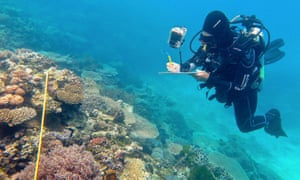Extract from The Guardian
Exclusive: ‘Confidential’ draft acknowledges coral bleaching but does not make any attempt to address climate change


The Northern Great Barrier Reef
Response Plan, marked “draft” and “confidential”, begins by describing
the bleaching event as “the worst ever coral bleaching” and attributes
its cause to climate change.
It says the plan will be “nested under the Reef 2050 plan”, which is a document the federal and Queensland governments created to convince Unesco not to include the Great Barrier Reef on its “world heritage in danger” list.
On Thursday the government needs to report to the Unesco world heritage committee on the implementation of the Reef 2050 plan, as well as how it has been funded.
But, in June, the Guardian revealed Australia would also need to report on how it is responding to this year’s bleaching event.
At the time, Tim Badman, the director of the IUCN’s world heritage program, which advises the committee on the state of its natural world heritage properties, told the Guardian: “We would expect that that report from Australia is going to cover all the significant things that have happened since June 2015 and whether there are changes in the picture of the management or the response that is needed … The bleaching event is a new issue to be considered.”
It is not known whether this plan is what the government intends to present to Unesco in response to that requirement.
It was revealed this week the bleaching appeared to kill about 67% of coral in the northern third of the reef. Across the entire reef, early estimates suggested about 22% of coral had died but scientists now say that figure is likely to be higher.
But the government’s plan for dealing with the bleaching, at least in its draft from October, appeared unable to point to any significant new action.
The document indicates the list of activities under “new initiatives to boost recovery” are not complete but it does indicate they require “no new money” and mostly deal with reducing sediment runoff through gully remediation.
Under the actions labelled as “additional” since 2015, it lists a grab-bag of activities initiated by other groups, including WWF. That includes the two shark licenses WWF bought, which they will retire, and research they are conducting into turtle health – neither of which were primarily a response to bleaching.
The draft document was presented to the Reef 2050 advisory committee, which mentioned it in its communique on 11 October. The communique said the committee “welcomed the draft and provided comments”.
“The committee noted that the aim was to finalise the Northern GBR Response Plan by the end of 2016,” the communique said.
It remains unclear whether this document was still set to be completed by the end of 2016 or whether it would form the basis of the government’s reporting to Unesco in relation to the bleaching.
The government is also preparing a Reef 2050 plan investment framework, which is expected to form a key component of its reporting to Unesco on Thursday.
A Queensland government study found $8.2bn needed to be spent over 10 years to reach water targets set in the Reef 2050 plan. The government currently says it is spending just $2bn and much of that is not being spent on water quality but also other activities such as maritime safety.
A spokeswoman for the federal Department of Environment and Energy said: “The department does not comment on draft confidential reports. Australia will provide its status update on the Reef 2050 plan to Unesco on 1 December 2016.”
No comments:
Post a Comment